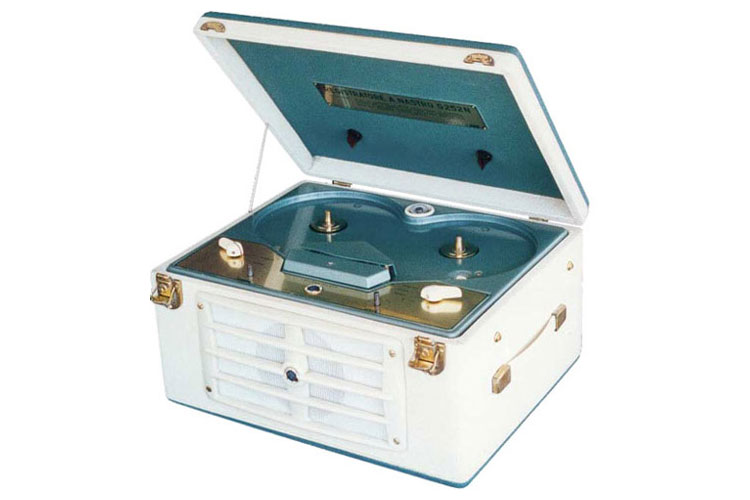Technical Details
Brand: Geloso
Model:G-252
Category:Vintage
Application:Consumer
Electronics:Tube
Equalization:IEC
Country of Manufacture:Italy
Tracks:1/2 Rec/PB
Speeds: 1 7/8, 3 3/4
Max Reel Size("): 5"
Number of heads: 2
Head Composition: Permalloy
Head Configuration: Mono - Half-Track
Auto Reverse?:No
Voltage(s): 220-240v
Sound quality rating:5 / 10
Long-term reliability rating: 5/ 10
Additional Details
Description
The G252 is the little brother of the G250 (considered to be a semi-prefessional machine in those days) and the G252 was specially developed to meet the request of a special client… the Vatican.
The fortunes of the Geloso company were very much linked to the needs of the Vatican. Geloso equipment was in many cases purpose-built for the church. As a result there were Geloso systems in every church in Italy, great PR since 99% of Italians were catholic and went to church regularly in those days. And, of course, what was good enough for the “church” was good enough for the church-goers!
Installing amplification systems in churches, theatres and other catholic organizations Geloso were aware that they needed some sort of recording system to be employed from time to time: conferences, at schools, local festivals to name just a few and they solved the solution with the G252.
High-Fidelity wasn’t such a big issue as was the need to sell a lot of recorders and spread them all over the country, however they needed a machine that would be very reliable, robust enough to survive being operated by many different people, most of whom had never seen a recorder before!
The Geloso company made the G252 out of the G250 using the same heavy duty mechanical frame but offering a slower speed for the tape transport: it was a two-speed machine operating at 3¾ & 1 ips. Speed-change was easily effected by turning a knob placed underneath the take up reel – a clever way to ensure that the recorder had to be in the STOP mode so as to avoid tape and transport damage.
As the G252 was primarily intended for use with an existing sound system (Geloso, of course) the internal amplifier and speaker was of a lower class than the G250, however it maintained the same solenoid assisted system for the tape transport, eliminating mechanical faults caused by improper function selection (child-proof!). This also permitted remote control when connected to the Geloso rack mount modular system, which in most cases consisted of amplifier, microphone-mixing system, record-player, tape recorder and the hard-wired remote control to operate it all.
The G252 was a lot cheaper than the G250 to maintain and operate, with less tubes to replace (four versus nine) and less tape used for the same recording time.
There were two motors one connected to the capstan flyweel with speed change operated by idler wheels, and one for the reels. The transport knob was a mechanical system which, once in the correct position, engaged a microswitch which activated the electromechanical (solenoid) part of the system.
There was one major design flaw however. As was the case with most of the early Geloso recorders the idler wheel betwen the capstan motor and the flyweel was always in the drive position even when the transport was turned off. So a recorder that wasn’t kept in regular service would suffer from the motor shaft leaving a deep print in the rubber idler wheel which was constantly pressed against it and developed a ‘flat spot’. This would inevitably lead to an audible ‘click’ and excess wow and flutter. Fortunatelt it is still possible to change the rubber ring mounted on the idler wheel in 5 minutes (it takes an easy-to-find squared O-ring like the ones used as gasket for water drains).
To overcome this problem it is necessary to store the G252 with the speed change knob positioned half-way between the two speeds. Unfortunately this doesn’t work for the G250-N as it is a single speed machine.
Additional Info
|
Model
|
252 |
|
Year
|
1955 |
|
Track system
|
half-track mono |
|
Heads
|
two |
|
Motors
|
two |
|
Maximum reel size
|
7″ |
|
Tape speeds
|
3¾ & 1 |
|
Frequency response (claimed)
|
3¾ ips: 70Hz – 9kHz |
| 1 |
|
|
Wow & flutter
|
0.2% |
|
Signal to noise ratio
|
-50db |
|
Valve complement
|
ECC83; ECC82; EL84; 6E5GT |
|
Audio output power
|
4 watts |
|
Inputs
|
microphone (max 0.5mV), radio/pickup (max50mV) |
|
Outputs
|
external amplifier: 0.5 V at 10Kohm, external speaker: 5 ohm |
|
Speaker(s)
|
small internal |
|
Dimensions
|
16¼ x 9 x 13½” (410 x 230 x 340 mm) |
|
Weight
|
30.8 lbs (14 kg) |


